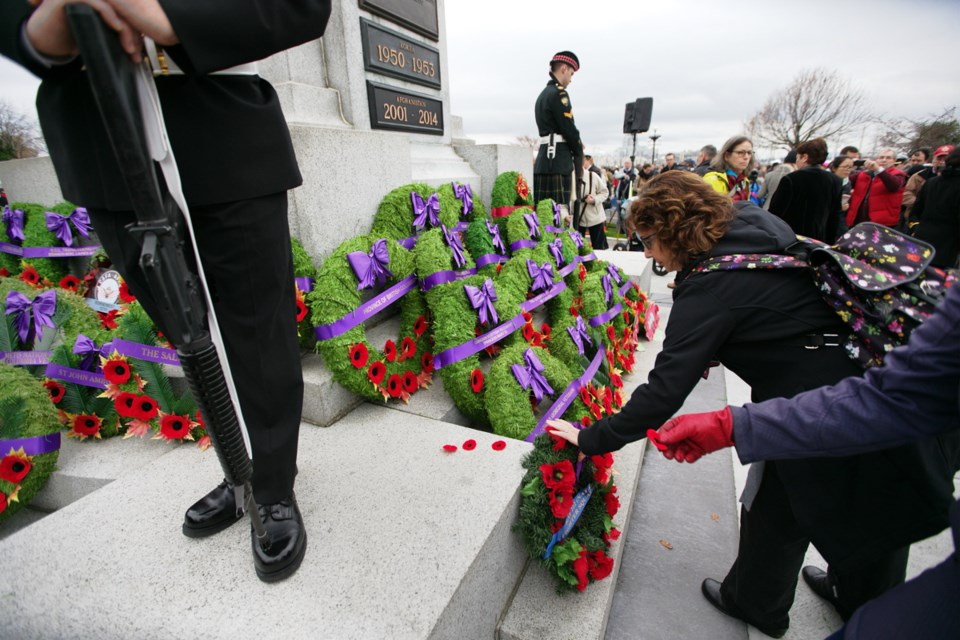The significance of standing guard at the cenotaph on Remembrance Day was brought home for three Victoria men on Friday.
Leading Seaman John Barazzuol, 33, who served two combat tours in Afghanistan and lost 10 friends there, “for a long time” wanted to be a cenotaph guard.
“It’s an honour to get a chance to guard the memorial of fallen soldiers,” Barazzuol said. “I find it really emotional for me and many of my peers because we have been heavily vested in that system and process and tradition.”
For those who are not invested in such traditions, said Barazzuol, “I think it’s our privilege to live in a country in which we can have that option of not being invested in military, or war, or conflict and that’s beautiful in its own right.”
He maintains no one truly survives war. “For combat vets, it’s very difficult because you’re not whole when you come back and adjusting to coming back to a first-world country is really traumatizing, it’s more difficult than going to war.”
Survival for him was found in a strong peer group that shares its collective fears and traumas and supports one another “so we’re all okay.”
Decorated CFB Esquimalt Leading Seaman Kyle Ruttan, 31, stood guard at the cenotaph in Ottawa, on Friday — one of six Canadian Armed Forces members chosen for that honour.
“There’s no words to describe it,” said Ruttan, in a phone interview from Ottawa.
“To be able to stand up there and to represent the fallen is a phenomenal honour,” said Ruttan. “I’ve lost two friends to suicide and one in theatre and to be able to stand up there and represent them, in front of the nation, and all who have gone before us.”
Whether a soldier falls in combat or afterward makes no difference, Ruttan said.
It’s words like that — the recognition of the effects of post traumatic stress disorder on the mental health of soldiers — that bring some solace to Silver Cross mother, Sheila Fynes, and her husband, Shaun. The Fynes have fought eight years to restore the memory of their son, Stuart Langridge.
“In the beginning people couldn’t even put the four letters [PTSD] together,” said Sheila Fynes. Mental illness was not as well understood and suicide in the military was viewed as dishonourable.
Langridge, from Richmond, served overseas in Bosnia and then in Afghanistan.
After he returned to his base in Edmonton in 2005, his life spiraled. Doctors believed the root cause was PTSD. He attempted suicide several times and on March 15, 2008, the 28-year-old completed it.
The Fynes have fought since to have veterans who died by suicide commemorated. The Fynes, with son Michael, were among thousands who gathered at the cenotaph on the grounds of the B.C. legislature on Friday.
At the end of the ceremony, Shaun Fynes found himself gazing up at the cenotaph, recalling when his son stood guard at cenotaphs in Richmond and Vancouver.
“It was a couple of years he stood there with his rifle on the cenotaph,” said Shaun Fynes.
“It was at least twice, maybe three times.
“Stuart was just fiercely, fiercely proud to do that,” Fynes said.
“The day he did it in Vancouver the heaven’s opened up and there was a downpour.” It was Remembrance Day 1999 and despite the rain beating down, Langridge was stoic and stood watch.
Now Langridge is a fallen soldier, and remembered.



